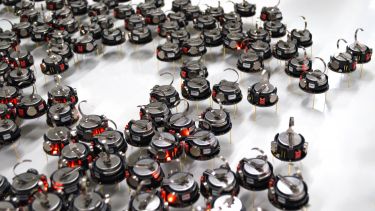How do robots perform medical miracles?

Event details
Description
The Department of Automatic Control and Systems Engineering (ACSE) and the Department of Electronic & Electrical Engineering (EEE) at the University of Sheffield would like to invite you to join us for ‘Women in Control: Robotics and Medical Miracles’. Spend the day with us and attend mini lectures, join the lunch time mini expo, get hands-on in the lab session and meet our students and alumni. This event is for girls in years 9, 10 and 11 who want to find out more about careers in robotics, mechatronics and electrical and electronic engineering.
The development of medical robots has been a major innovation for the medical industry, enabling huge leaps in both surgery and patient recovery. The Department of Automatic Control and Systems Engineering and The Department of Electronic and Electrical Engineering are heavily involved in the research and development of new technologies used in medicine and healthcare.
The morning will be a series of bite-sized 20 minute lectures, including:
Dr Mahnaz Arvaneh works with brain-Computer interfaces and leads pioneering work in stroke rehabilitation. In her mini lecture she will talk about how she applies machine learning which is underpinned by statistics and probability to her research - demonstrating a practical application of maths in bioengineering.
Dr Dana Damian’s mini lecture ‘Living with robots inside our body’ will highlight the increasing number of technologies that have been developed to solve various health issues from identifying diseases to providing therapies.
The creators of the MediTel robot, a robot that provides remote medical treatment in hazardous environments, will present a short talk on the robot design and the integrated technologies including CAD, virtual reality, telexistence, advanced sensors and robotics.
Dr Charlotte Buckley, holds a PhD in Experimental Psychology, she will conclude the mornings lectures talking about decision-making and advanced population health modelling. Dr Buckley is currently developing new models to explore the psychological mechanisms and environmental factors underlying associations between socioeconomic inequalities and health behaviours such as alcohol use and food choices.
Lunch will be provided in our Engineering Heartspace and you will have the chance to ‘Meet the students & societies’ such as Women in Engineering, BAME Engineers and the Roboteers.
In the afternoon the students will take part in a hands-on lab session: Wearable Heart-Rate Monitor Using Infra-Red Optoelectronics which will be run by Dr Rola Saad, University Teacher and Associate Fellow of the Higher Education Academy. The activity will be introduced by Prof Jo Shien Ng, Professor of Semiconductor Devices.
| Time | Session Details | Location |
|---|---|---|
| 09:30-10:00 | Students and Teachers arrive, refreshments and pastries on arrival. |
Diamond building |
| 10:00-10:10 | Welcome & Introduction | Diamond building |
| 10:10-10:30 | Mini Lecture 1: Brain-Computer Interface, Dr Mahnaz Arvaneh | Diamond building |
| 10:30-10:45 | Mini Lecture 2: Medical robots for saving lives in emergency environments | Diamond building |
| 10:45-11:10 | Mini Lecture 3: Living with robots inside our bodies, Dr Dana Damian | Diamond building |
| 11:10-11:30 | Mini Lecture 4: Decision-making and advanced population health modelling, Dr Charlotte Buckley | Diamond building |
| 11:35-12:00 | Tour of Diamond Building | |
| 12:00-13:00 | Lunch and ‘Meet the students & Societies’ | Heartspace |
| 13:10-14:40 |
Hands on lab sessions: 1) Introduction to the lab by Prof Jo Shien Ng 2) Wearable heart-rate monitor using infra-red optoelectronics with Dr Rola Saad |
Diamond building and Sir Henry Stephenson Building |
| 14:45-15:00 |
Wrap-up session |
Diamond building |
Prep for event:
We'll be using wooclap - so please bring your mobile devices.
To study engineering you'll need to have taken A level maths and a science. At the Women in Control event you'll learn how maths, computing and engineering underpin medical technologies, and explore how your interest and imagination can lead to a degree in automatic control and robotics at the University of Sheffield.
